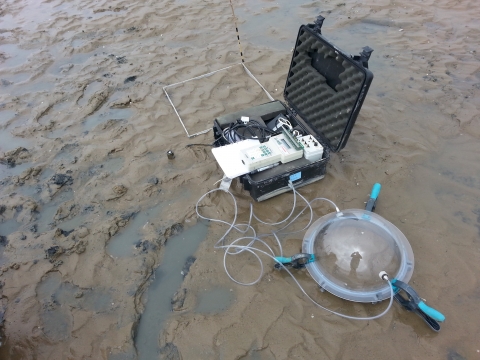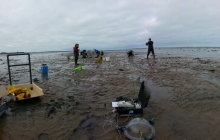
The Bio-TIDE project is an Horizon 2020 ERA-NET COFUND project financed by the Biodiversa program. The aim of the project is to bring together scientists and stakeholders in studying the relationships between microbial diversity and ecosystem functioning/services in intertidal environments.
Field and laboratory experiments in combination with inverse modelling will allow assessing how microbial biodiversity is related to tidal flat C cycling and which organisms and functional groups are involved. Two field experiments will provide a detailed description and quantification of the relation between microbial, meio- and macrobenthic taxonomic and functional diversity on the one hand and C fluxes on the other in contrasting tidal flat sediments, and this at high taxonomic and functional resolution.
The laboratory experiments will enhance our understanding of the mechanisms underlying these BEF relations, and are specifically aimed at addressing important knowledge gaps in tidal flat C cycling. Special attention will be paid to two highly relevant ecosystem services which are directly and indirectly related to the tidal flat C cycle, sediment stabilization and commercial shellfish (oyster) production. As in the two field sites BMA and meiobenthos are dominated by benthic diatoms and nematodes respectively, the experiments will focus on these organisms. The data will feed into inverse models.
Comparing the results of the two field campaigns, the mechanistic BEF insights obtained and the inverse models will allow identifying general and emergent patterns in tidal flat BEF relations and will help addressing potential contextual variation in these patterns. This information will be crucial for evaluating to what degree our results can be extrapolated to the scale of whole tidal flat ecosystems using remote sensing approaches.
BOREA contact : Cédric Hubas, cedric.hubas@mnhn.fr
Partners:
Protistology, Aquatic Ecology Group | Ghent University
Marine Biology Research Group | Ghent University
BOREA MNHN | Concarneau Marine Station, MNHN (Cédric Hubas, Frédéric Olivier)
BOREA MNHN | Paris, MNHN (Dominique Lamy, Tarik Méziane, Najet Thiney)
BOREA UCN | Caen, UCN (Francis Orvain)
Mer Molécules Santé équipe RSBE | Université de Nantes
École Polytechnique Fédérale de Lausanne | Switzerland
Sediment Ecology Research Group | University of St Andrews
OSUNA - Observatoire des Sciences de l'Univers Nantes Atlantique
Marine Station Ostend (MSO)
Marine Alliance for Science and Technology for Scotland (MASTS)
More information (geolocalisation map)



